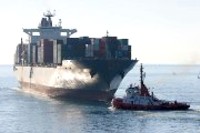Shipping industry moves to reduce emissions
 Maritime shipping is the world’s most carbon-efficient form of transporting goods and the industry has now taken steps to further improve the fuel efficiency and reduce the carbon footprint of its vessels and supply chain.
Maritime shipping is the world’s most carbon-efficient form of transporting goods and the industry has now taken steps to further improve the fuel efficiency and reduce the carbon footprint of its vessels and supply chain.Three large multinational corporations, which together ship over 350 million tons of commodities annually, have agreed to charter only the most fuel-efficient shipping vessels on the market.
This commitment to both locate and use only the cleanest ships is being hailed as a game changer for those engaged in the shipping sector, as the effort not only reduces the industry’s impact on the planet but also increases the bottom lines of its customers.
The International Maritime Organization (IMO) has been pursuing mrasures to reduce greenhouse gas (GHG) emissions from international shipping in recognition of the magnitude of the climate change challenge and the intense focus on this topic.
According to a recent Journal of Commerce article, ‘the EU is considering several options for curbing emissions, including market-based mechanisms, and the creation of a system to monitor, report and verify pollutants based on fuel consumption will be the first step. The efforts will “feed” into the International Maritime Organization’s push to reduce emissions.”
“Shipping is a global industry and needs global solutions to address its environmental footprint. As a result, we are all working towards an internationally agreed global solution to decrease greenhouse gas emissions from ships,” said EU Commissioner for Climate Action Connie Hedegaard in a recent statement.
She affirmed that it was the EU’s intention to pursue monitoring, reporting and verification system for maritime shipping in early 2013. “At the same time, we will continue the debate with stakeholders on which measure can successfully address the EU’s greenhouse gas reduction objectives.” she added.
In related news, Rotterdam, Europe’s biggest and busiest port is working with shipping companies to expand the use of liquefied natural gas (LNG) as a fuel of choice, which, compared to diesel engines, can reduce carbon dioxide (CO2) emissions by 25 percent and cut sulphur emissions by as much as 80 percent.
Rotterdam’s plan to boost infrastructure for LNG use in ports throughout the Rhine river region is part of its efforts to meet new European Union anti-pollution laws that require a sharp reduction in sulphur content in shipping fuels from 2015. International shipping accounts for about three percent of the world’s CO2 emissions, but if left unregulated, could account for 18 percent by 2050.
Many ports around the world are moving toward less carbon intensive operating procedures. The Port of Metro Vancouver trades $75 billion in goods with more than 160 trading partners annually and has taken a leadership role in reducing air emissions in North America.
Since 2005, the port, along with Metro Vancouver and Environment Canada, has maintained an ocean-going vessel emission inventory in order to provide a baseline that will help track progress towards reducing emissions. The Air Action Program works to reduce emissions by focusing on technology use and promoting operational efficiencies to maintain air quality.
Another initiative championed by the port is the EcoAction Program, which provides reduced harbour dues rates to ocean-going vessels that excel in environmental stewardship. These incentives encourage a wide variety of technology and fuel options to vessels in order to promote and build awareness for a number of alternative emission reduction practices.
You can return to the main Market News page, or press the Back button on your browser.

